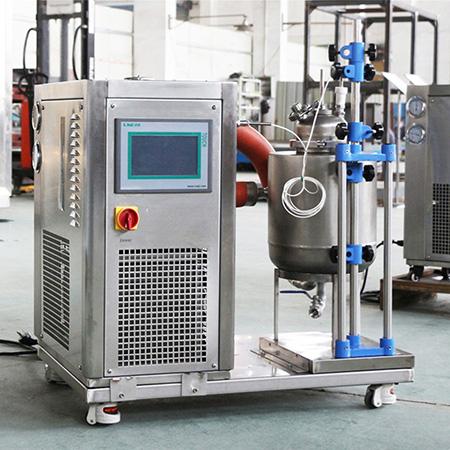Why does the heat transfer oil control system device heat transfer oil coke exist?
In the heat transfer oil control system device, the heat transfer oil is used for the cooling and heating temperature control. If it is not the same as the LNEYA, the use of the fully closed circuit can affect the formation of certain coking, resulting in failure.
In the heat transfer oil control system device, three main chemical reactions occur in the heat transfer process: thermal oxidation reaction, thermal cracking and thermal polymerization. Coking occurs from thermal oxidation reactions and thermal polymerization reactions. The thermal polymerization reaction occurs because the heat transfer oil is heated during the operation of the heating system, and the reaction generates macromolecular high-boiling substances such as condensed aromatic hydrocarbons, colloids and asphaltenes, which are gradually deposited on the surface of the heater and the pipeline to form coking.
The thermal oxidation reaction of the heat transfer oil is mainly caused by the heat transfer oil in the expansion tank of the open heating system contacting the air or participating in the circulation, and the reaction generates low-molecular or high-molecular acidic components such as alcohol, aldehyde, ketone, acid, etc., and further generates Glue, asphaltene and other viscous substances, then form coking; thermal oxidation is caused by abnormal conditions, once it occurs, it will accelerate thermal cracking and thermal polymerization, so that the viscosity increases rapidly, heat transfer efficiency decreases, causing overheating and furnace tube Coking. The resulting acid can also cause corrosion and leakage of equipment.

The heat transfer oil control system device heat transfer oil will form a heat insulation layer during use, resulting in a decrease in heat transfer coefficient, an increase in exhaust gas temperature, and an increase in fuel consumption. On the other hand, since the temperature required for the production process remains unchanged, The heating temperature rises sharply, causing cracks, causing serious accidents such as equipment and operator personal injury.
In the heat transfer oil control system device, if the heat transfer oil has a coking failure, the heat transfer oil control system device will be unavailable, and the heat transfer oil control system device is required to perform certain maintenance work.
(This article is from the source network. If there is any infringement, please contact LNEYA for deletion, thank you.)
 LNEYA Industrial Chillers Manufacturer Supplier -
LNEYA Industrial Chillers Manufacturer Supplier -











